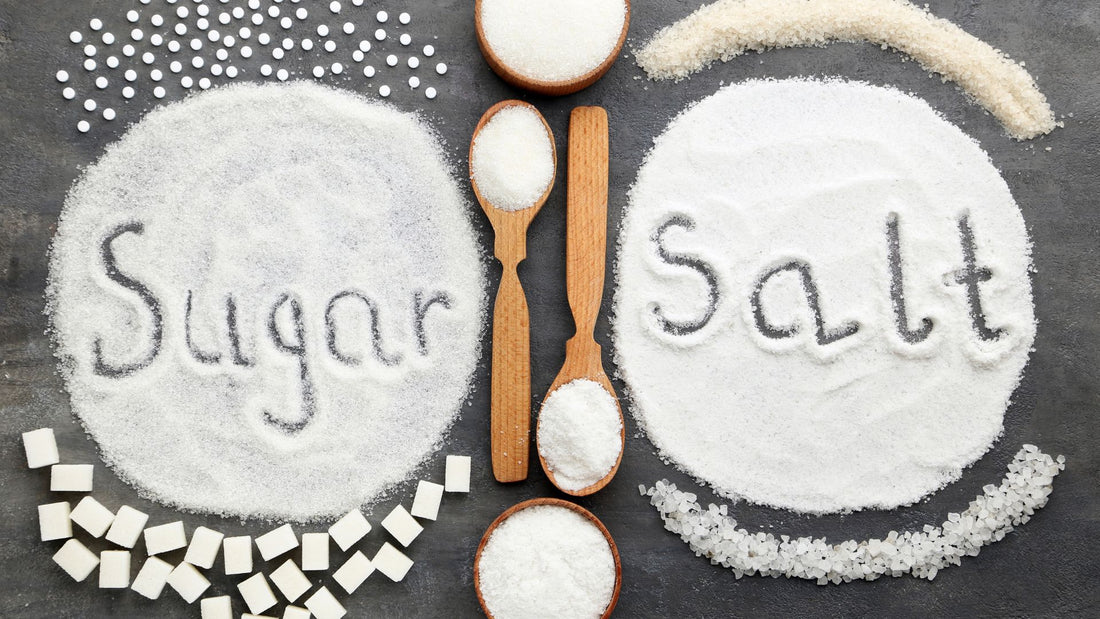Adding sugar and salt to your baby's food might seem harmless, but it can come with significant risks. In this blog, we are going to discuss why it should be a no-sugar and no-salt diet for your baby, The ways you can limit the amount of salt and sugar in your baby's diet, and how you can feed them healthy food without compromising the taste.
Welcome to Bunnyhug Pregnancy and Parenting, Your Trusted Companion on the Incredible Journey of Pregnancy and Parenthood, Where all the contents are carefully curated by us and verified by Dr. Pranesh.
Why Should You Avoid Sugar in Your Baby's food?

When it comes to the health of your baby, it is crucial to avoid sugar. Though it is obvious to avoid sugar with your baby, for how long should you do it? According to the American Academy of Paediatrics and the World Health Organization, it is advised to avoid sugar until children are at least 2 years old.
Adding too much sugar can have many health risks, including early tooth decay, unhealthy weight gain, and an increased likelihood of obesity, without actually having any nutritional benefits.
Why you need to avoid salt in your baby's food?
A baby’s taste preferences are shaped during infancy, and they gravitate towards it more and more as they grow older, there is no ingredient out there that is more addictive than salt, which can set the stage for poor eating habits. Yes! Introducing salt to your baby’s diet can be extremely dangerous. Many parents assume that a pinch of salt won’t hurt, but the truth is quite the opposite.
Babies have a very delicate system that is not completely capable of handling the excessive amount of sodium in salt. This can cause dehydration and even strain the baby's kidneys, leading to long-term health issues.
You may ask, how will your baby get sodium if you completely avoid salt? To answer that, Breast milk provides the required supply of sodium during the first six months after pregnancy and most of our natural foods have sufficient salt content.
Can I add jaggery, palm jaggery/ palm sugar, or other natural sweeteners to baby food?

As mentioned earlier, it's best to avoid adding sugar or any sweeteners, including natural ones like jaggery or palm sugar, to your baby's food during the first year of life. This helps in developing healthy eating habits and reducing the risk of developing a sweet tooth which is basically a preference for sweet foods.
After your baby reaches the age of one, you can gradually introduce a wider range of foods, including those with natural sweeteners, in moderation.
What about the salt content in commercial baby food?

When selecting commercial baby foods, carefully read the food labels. Look for products labelled as "low in sodium" or "no added salt." These options are typically better for infants.
It is important to remember that, preparing homemade food gives you more control over the ingredients, including salt. Homemade infant foods can be made without adding too much salt, making it a good choice for parents who want to monitor their baby's sodium and salt intake more closely.
What are the ways to limit the amount of salt and sugar in your baby's diet

1. Breastfeed or Provide Formula:
Breast milk and infant formula milk provide the essential nutrients your baby needs without added sugar intake
2. Choose Whole Foods:
Focus on whole, unprocessed foods, on your infant's diet. These include fresh fruits, vegetables, lean proteins, and whole grains.
3. Homemade Baby Food:
Making your own baby food allows you to control the ingredients. Do not add salt and sugar when preparing homemade baby food. Steam or boil vegetables until they are soft and puree them without adding any seasonings.
4. Limit Processed Foods:
Minimize the consumption of highly processed and packaged baby foods, as these often contain salt and sugar. Opt for nutritious foods like vegetables and fruits over canned ones, as canned varieties may contain added sodium or sugar.
How can I make my baby's food tasty without sugar and salt?

1. Choose Flavourful Ingredients:
Opt for ingredients that naturally have a pleasant taste. For example, sweet potatoes, carrots, and fruits like apples and pears offer natural sweetness. Onions, garlic, and herbs can add savoury flavours. These foods provide taste without added salt and sugar for babies.
2. Herbs and Spices:
Use herbs and spices to add flavour without excess salt. Mild herbs like parsley, basil, and mint are good options. Just be mindful of any potential allergens, and introduce them one at a time.
3. Fruit and Vegetable Combinations:
Mixing different fruits and vegetables can create interesting and balanced flavours. For example, you can combine sweet potato with apples or carrots with peas.
4. Citrus Zest:
Grated citrus zest (such as lemon or orange) can add a burst of flavour to baby food. Make sure to wash the fruit thoroughly before zesting. This is a great way of adding flavour without adding salt and sugar
5. Homemade Broths:
You can create a simple vegetable or chicken broth by boiling vegetables or meat without adding salt. Use this broth to cook grains like rice or quinoa for added flavour.
6. Natural Sweeteners:

If you want to add sweetness to your baby's food, consider natural sweeteners like mashed banana, unsweetened applesauce, pureed dates, or other fruit purees. These options provide sweetness without added sugar
Remember that it may take some time for your baby to develop a taste for different flavours. Be patient and continue to offer a variety of nutritious foods to expose them to different tastes and textures. By using these techniques, you can create tasty and healthy meals for your baby without relying on sugar or salt.
While we strive to provide accurate and reliable information, they are intended for general guidance and educational purposes only. Remember every pregnancy and parenting is unique and most importantly your health and the well-being of your child are paramount. Therefore, we recommend consulting your own healthcare provider for personalized guidance and recommendations.


